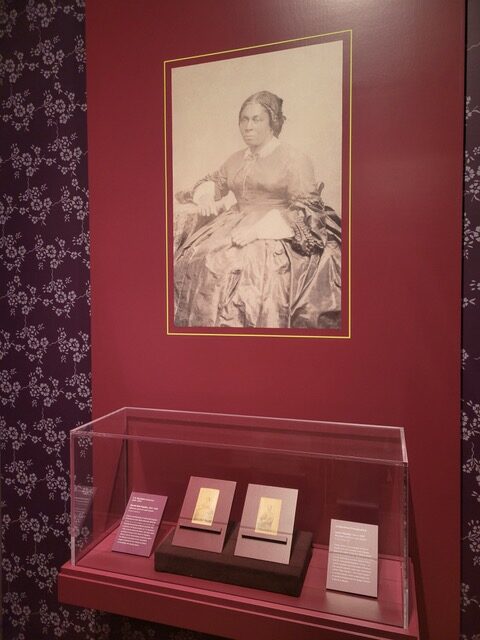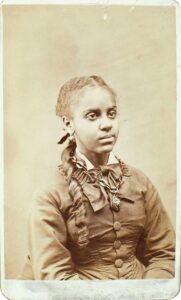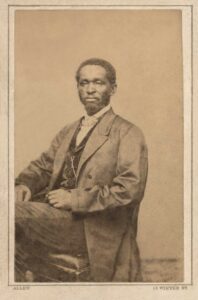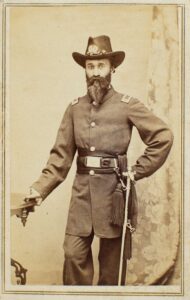‘Framing Freedom: The Harriet Hayden Albums’ offers glimpse of Black lives in Civil War-era Boston

Harriet Hayden (about 1816-1893) and her husband Lewis Hayden (about 1811-1889) were a Black Boston power couple in the community of abolitionists and equal right activists centered in Beacon Hill in the 1860s. Self-emancipated from slavery in Kentucky in 1844, they turned their home at 66 Phillips St. into a haven for others bound northward to freedom and a meeting place for like-minded visitors to further their shared cause.

Unidentified Black woman, albumen print on card mount, Jas. W. Turner, photographer. PHOTO: Courtesy Boston Athenaeum
Such visits were marked by the exchange of cartes-de-visite, business-card-size portrait photographs. A medium to honor friendships and shared values, the portraits were displayed in small albums visible on parlor tables. In the early 1860s, Robert Morris, one of this country’s first Black lawyers, and Samuel T. Birmingham, M.D., expressed their esteem for Harriet Hayden by presenting her with such albums. She filled them with portraits of multigenerational sitters, from prominent anti-slavery leaders to friends and neighbors. Each portrait is a carefully staged example of self-presentation.
Harriet Hayden’s albums and home-based advocacy are receiving their first major exhibition through June 22 at the Boston Athenaeum, a short walk from the Haydens’ house, now identified with a bronze plaque. Co-curated by Makeda Best, Ph.D., deputy director of curatorial affairs at the Oakland Museum of California, and Virginia Reynolds Badgett, Ph.D., former assistant curator at the Boston Athenaeum and a scholar of American art and material culture, “Framing Freedom: The Harriet Hayden Albums” offers a rare close-up of the Haydens and their community.
“This exhibition draws much-needed attention to Harriet Hayden’s role in Boston’s abolitionist movement, centering the Hayden home as a crucial site for a societal crusade to which they devoted their lives,” writes Best in the catalog, itself a fine keepsake.

Lewis Hayden, about 1860, albumen print on card mount, unidentified photographer. PHOTO: COURTESY BOSTON ATHENAEUM
“Her collection of portraits shows the breadth of her network, including very well-known figures as well as everyday people,” says Badgett. “We see how activism worked within her community of Black Bostonians.”
While Lewis Hayden was a prominent public figure, Harriet Hayden’s activism was a potent complement. More than 1 in 4 freedom seekers traveling through Boston spent time in the Hayden home, where they could find shelter, clothing and aid in making their way north. Other visitors included Frederick Douglass, Sojourner Truth and John Brown, shortly before he led the 1859 Harper’s Ferry raid. Harriet Hayden’s hospitality prevailed in the parlor and dining room, but the house was also equipped with rifles, a gunpowder keg and a hidden escape hatch.
In the exhibition, her two albums, with stamped brown leather covers and decorative brass clasps, are displayed in a case. Enlarged prints of the portraits they hold fill the surrounding walls.

John V. DeGrasse, M.D. 1863-1864,
albumen print on card mount, Edward Mitchell Bannister, photographer. PHOTO: COURTESY BOSTON ATHENAEUM
Also on view are examples of the community’s savvy use of the printing press. A hand-colored Currier and Ives lithograph promotes the first regiment of free African Americans, the 54th Massachusetts Volunteer Infantry Regiment. A broadside opposing passage of the Fugitive Slave Law is signed by Lewis Hayden as president of the Friends of Freedom. Juxtaposed with an 1864 print of the Emancipation Proclamation from the Hayden home is merchandise designed to garner sympathy — and funds — for the cause: an ornate silk purse and a porcelain tea set bearing images of enslaved people.
“Harriet Hayden’s two small leather-bound albums open a world to us,” says John Buchtel, the Athenaeum’s curator of rare books and head of special collections. “They provide insight into 19th-century efforts to end slavery and establish equal rights from the perspective of a courageous Black woman who played an active part. The legacy of Harriet Hayden deserves to be better known.”
Her legacy includes the first scholarship to support Black students at Harvard Medical School. Created by her bequest, the Hayden Scholarship continues to be awarded to this day.
View the albums online at bostonathenaeum.org/digital/collection






